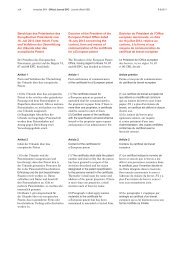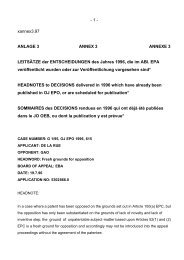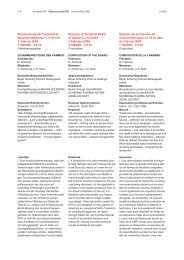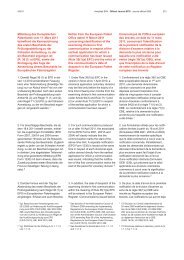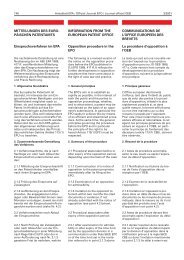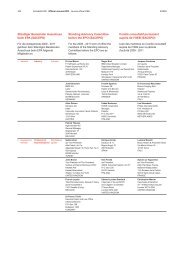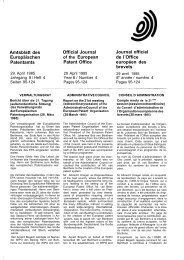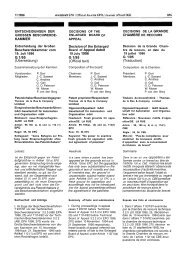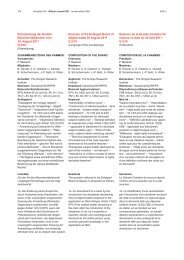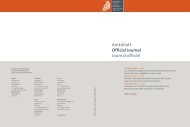Entscheidung der Großen Beschwerdekammer vom 23. Juli 2012 G ...
Entscheidung der Großen Beschwerdekammer vom 23. Juli 2012 G ...
Entscheidung der Großen Beschwerdekammer vom 23. Juli 2012 G ...
Create successful ePaper yourself
Turn your PDF publications into a flip-book with our unique Google optimized e-Paper software.
4/2013 Amtsblatt EPA Official Journal EPO Journal officiel OEB 207<br />
Gesetzgeber ein Anliegen war. Das<br />
zeigt sich eindeutig an <strong>der</strong> Entstehungsgeschichte<br />
dieser Regel, die ihren<br />
Ursprung in einem Entwurf des Artikels<br />
159 a) (vgl. BR/49 d/70, S. 9) hat,<br />
<strong>der</strong> dann seinerseits in den Entwurf einer<br />
Ausführungsordnung <strong>vom</strong> April 1972<br />
unter Artikel 91 (1) (vgl. BR/185 d/72)<br />
aufgenommen wurde; darin hieß es,<br />
dass Verfahrensfehler berichtigt werden<br />
können, sofern keine nachteiligen<br />
Wirkungen u. a. für Dritte entstehen.<br />
Letztlich wurde nur an <strong>der</strong> restriktiven<br />
Fassung <strong>der</strong> heutigen Regel 89 EPÜ<br />
festgehalten, die jegliche nachteilige<br />
Wirkung ausschließt."<br />
Nach Auffassung <strong>der</strong> <strong>Großen</strong> <strong>Beschwerdekammer</strong><br />
kann Regel 140 EPÜ nicht<br />
zur Berichtigung von Patenten herangezogen<br />
werden. Dies steht im Einklang<br />
mit dem – in <strong>der</strong> oben erwähnten früheren<br />
<strong>Entscheidung</strong> zum Ausdruck<br />
gebrachten – Wunsch, nachteilige Wirkungen<br />
jeglicher Art zu vermeiden. Dafür<br />
sprechen mehrere Gründe, die alle mit<br />
<strong>der</strong> notwendigen Rechtssicherheit und<br />
dem Schutz Dritter zusammenhängen<br />
(vgl. nachstehende Nrn. 6 bis 8). Dem<br />
Patentinhaber stehen trotzdem, sowohl<br />
vor als auch nach <strong>der</strong> Erteilung, angemessene<br />
Rechtsmittel zur Verfügung,<br />
um sicherzustellen, dass <strong>der</strong> Wortlaut<br />
seines Patents korrekt ist (vgl. nachstehende<br />
Nrn. 9 bis 13). Die Auffassung,<br />
dass Regel 140 EPÜ nicht zur Berichtigung<br />
von Patenten herangezogen werden<br />
kann, bedeutet, dass die Große<br />
<strong>Beschwerdekammer</strong> nur <strong>der</strong> Feststellung<br />
in T 850/95 zustimmt (s. vorstehende<br />
Nr. 3), wonach die im Erteilungsbeschluss<br />
genannten Unterlagen<br />
Bestandteil des Erteilungsbeschlusses<br />
werden, nicht aber <strong>der</strong> daraus gezogenen<br />
Schlussfolgerung, dass Fehler in<br />
diesen Unterlagen anschließend nach<br />
Regel 140 EPÜ berichtigt werden können<br />
(bzw. nach Regel 89 EPÜ 1973, die<br />
bei Ergehen <strong>der</strong> <strong>Entscheidung</strong> T 850/95<br />
in Kraft war; s. ABl. EPA 1996, 455, Nr. 2<br />
<strong>der</strong> <strong>Entscheidung</strong>sgründe, letzter Satz).<br />
6. Rechtssicherheit wird durch den Erteilungsbeschluss<br />
hergestellt, mit dem eine<br />
endgültige Fassung des Patents für die<br />
Zwecke aller folgenden Verfahren auf<br />
nationaler wie auf EPA-Ebene festgelegt<br />
wird. Ein europäisches Patent unterliegt<br />
mit seiner Erteilung nicht mehr <strong>der</strong> rechtlichen<br />
Zuständigkeit des EPA, son<strong>der</strong>n<br />
zerfällt – sofern nicht noch ein Einthe<br />
protection of third parties. This is<br />
evident from the history of Rule 89,<br />
which emerged from a draft version of<br />
Article 159(a) (see BR/49 d/70, page 9)<br />
incorporated in the draft Implementing<br />
Regulations of April 1972 un<strong>der</strong><br />
Article 91(1) (see BR/185 d/72) which<br />
deals with the correction of procedural<br />
errors as long as this does not adversely<br />
affect the interests of, inter alia, third<br />
parties. Finally, it was decided that<br />
Rule 89 EPC should be limited to its<br />
present, narrow wording, which rules out<br />
any possibility of such adverse effect."<br />
In the Enlarged Board's judgment<br />
Rule 140 EPC is not available to correct<br />
patents. This is consistent with the wish<br />
to rule out any possibility of adverse<br />
effects as expressed in its earlier opinion<br />
cited above. There are several reasons,<br />
all of which reflect the need for legal<br />
certainty and the protection of third<br />
parties, why this should be so (see<br />
points 6 to 8 below) while patent proprietors<br />
none the less have adequate<br />
remedies available, both before and<br />
after grant, to ensure that the text of<br />
their patents is correct (see points 9<br />
to 13 below). The non-availability of<br />
Rule 140 EPC to correct patents means<br />
that the Enlarged Board, while agreeing<br />
with the statement in decision T 850/95<br />
(see point 3 above) that patent documents<br />
referred to in a grant decision<br />
become an integral part of the decision,<br />
does not agree with the subsequent<br />
conclusion that errors in those documents<br />
may subsequently be corrected<br />
un<strong>der</strong> Rule 140 EPC (or Rule 89<br />
EPC 1973 which was in effect at the<br />
time of decision T 850/95 – see OJ EPO<br />
1996, 455, point 2 of the Reasons, final<br />
sentence).<br />
6. Legal certainty is served by the grant<br />
decision establishing a definitive text of<br />
a patent for the purposes of any subsequent<br />
proceedings, whether at national<br />
or EPO level. As from its grant, a<br />
European patent ceases to be within the<br />
jurisdiction of the EPO and becomes,<br />
subject only to the possibility of later<br />
EPO proceedings by way of opposition<br />
préoccupé par la protection des tiers.<br />
Cela ressort clairement de l'historique<br />
de cette règle, qui trouve sa source dans<br />
un projet d'article 159(a) (cf. BR/49 d/70,<br />
page 9) repris au projet de règlement<br />
d'exécution d'avril 1972 sous l'article 91(1)<br />
(cf. BR/185 d/72) dans lequel il est question<br />
de la rectification d'erreurs de procédure,<br />
pour autant que cela n'entraîne<br />
pas de préjudice entre autres pour les<br />
tiers. Finalement, seule la rédaction<br />
restrictive de la règle 89 CBE actuelle a<br />
été retenue, qui exclut toute possibilité<br />
de préjudice."<br />
Selon la Grande Chambre de recours,<br />
la règle 140 CBE n'autorise pas la rectification<br />
de brevets. Cela est conforme à<br />
la volonté d'exclure toute possibilité de<br />
préjudice, ainsi que la Grande Chambre<br />
de recours l'a indiqué dans son avis<br />
antérieur susmentionné. Il y a à cela<br />
plusieurs raisons, lesquelles reflètent<br />
toutes la nécessité de garantir la sécurité<br />
juridique et la protection des tiers (cf.<br />
points 6 à 8 ci-dessous). Les titulaires de<br />
brevet disposent cependant de moyens<br />
appropriés, à la fois avant et après la<br />
délivrance, pour s'assurer que le texte<br />
de leur brevet est correct (cf. points 9<br />
à 13 ci-dessous). Etant donné que la<br />
règle 140 CBE ne permet pas de rectifier<br />
des brevets, la Grande Chambre de<br />
recours, tout en partageant la constatation<br />
faite dans la décision T 850/95<br />
(cf. point 3 ci-dessus), selon laquelle<br />
les documents brevets cités dans une<br />
décision de délivrance deviennent partie<br />
intégrante de cette décision, réfute la<br />
conclusion qui en est tirée ensuite, à<br />
savoir que des erreurs contenues dans<br />
ces documents peuvent être rectifiées<br />
ultérieurement au titre de la règle 140<br />
CBE (ou de la règle 89 CBE 1973, en<br />
vigueur à la date de la décision T 850/95<br />
– cf. JO OEB 1996, 455, point 2 des<br />
motifs, <strong>der</strong>nière phrase).<br />
6. La sécurité juridique est assurée par<br />
la décision de délivrance, qui établit le<br />
texte définitif d'un brevet aux fins de<br />
toute procédure ultérieure, que ce soit<br />
au niveau national ou au niveau de<br />
l'OEB. A compter de sa délivrance, un<br />
brevet européen ne relève plus de la<br />
compétence de l'OEB et, à moins qu'une<br />
procédure d'opposition ou de limitation



